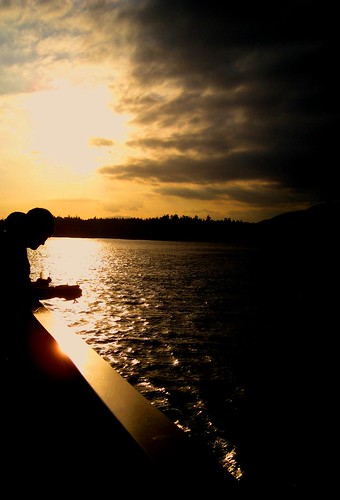
"Sailing To Byzantium" by: William Butler Yeats
That is no country for old men. The young
In one another's arms, birds in the trees
- Those dying generations - at their song,
The salmon-falls, the mackerel-crowded seas,
Fish, flesh, or fowl, commend all summer long
Whatever is begotten, born, and dies.
Caught in that sensual music all neglect
Monuments of unageing intellect.
An aged man is but a paltry thing,
A tattered coat upon a stick, unless
Soul clap its hands and sing, and louder sing
For every tatter in its mortal dress,
Nor is there singing school but studying
Monuments of its own magnificence;
And therefore I have sailed the seas and come
To the holy city of Byzantium.
O sages standing in God's holy fire
As in the gold mosaic of a wall,
Come from the holy fire, perne in a gyre,
And be the singing-masters of my soul.
Consume my heart away; sick with desire
And fastened to a dying animal
It knows not what it is; and gather me
Into the artifice of eternity.
Once out of nature I shall never take
My bodily form from any natural thing,
But such a form as Grecian goldsmiths make
Of hammered gold and gold enamelling
To keep a drowsy Emperor awake;
Or set upon a golden bough to sing
To lords and ladies of Byzantium
Of what is past, or passing, or to come.
In "Sailing to Byzantium" the poem is broken up into four stanzas, each describing a different part of the voyage and the feeling associate with it. Stanza one is the narrators departure to Byzantium. In stanza two the voyage done by boat and landing in Byzantium. In the third stanza, in the holy city of Byzantium and visiting the ancient landmarks.During the fourth stanza, the desire of the narrator to become a part of physical aspect of Byzantium.Ancient Byzantium was a city in Rome and was known as heaven, due to the vast works of art. Art was one of the most significant elements of the city and since Yeats believes art is essential to life and death, he uses Byzantium as the prime example of paradise in his poem.
So what? You ask, Yeats was able to take a complex and meaningful subject, break it into four parts in order for those who read it to understand the history being created during this time.
Soucre: http://www.online-literature.com/yeats/781/
I really like reading Yeats' poetry. Yeats was an Irish playwright and poet who lived from 1865 to 1939. Yeats' interests were Irish folklore and mythology, the occult, and political themes. Critics consider him one of the greatest poets of his time.
ReplyDeleteThat last phrase of the poem, "To lords and ladies of Byzantium / Of what is past, or passing, or to come." was amazing. I enjoyed the entire piece, but that last stanza was spectacular. It's interesting to notice how much religion has made an impact in the world of literature. Thanks for this insight!
ReplyDelete